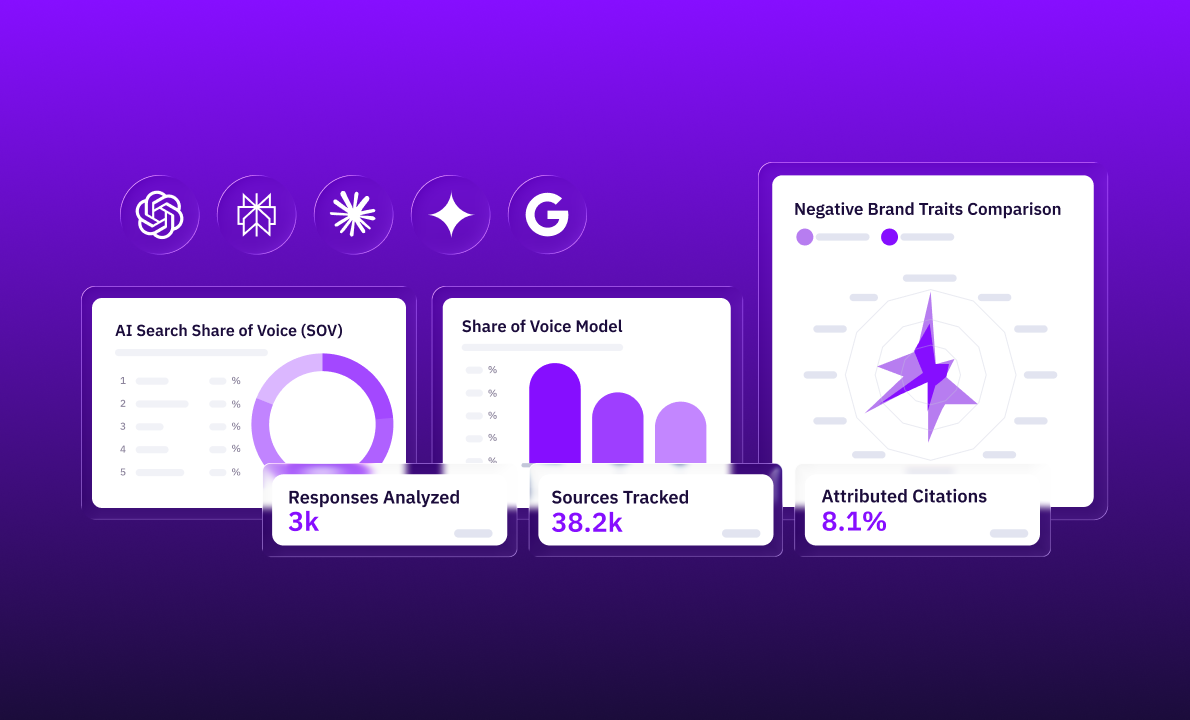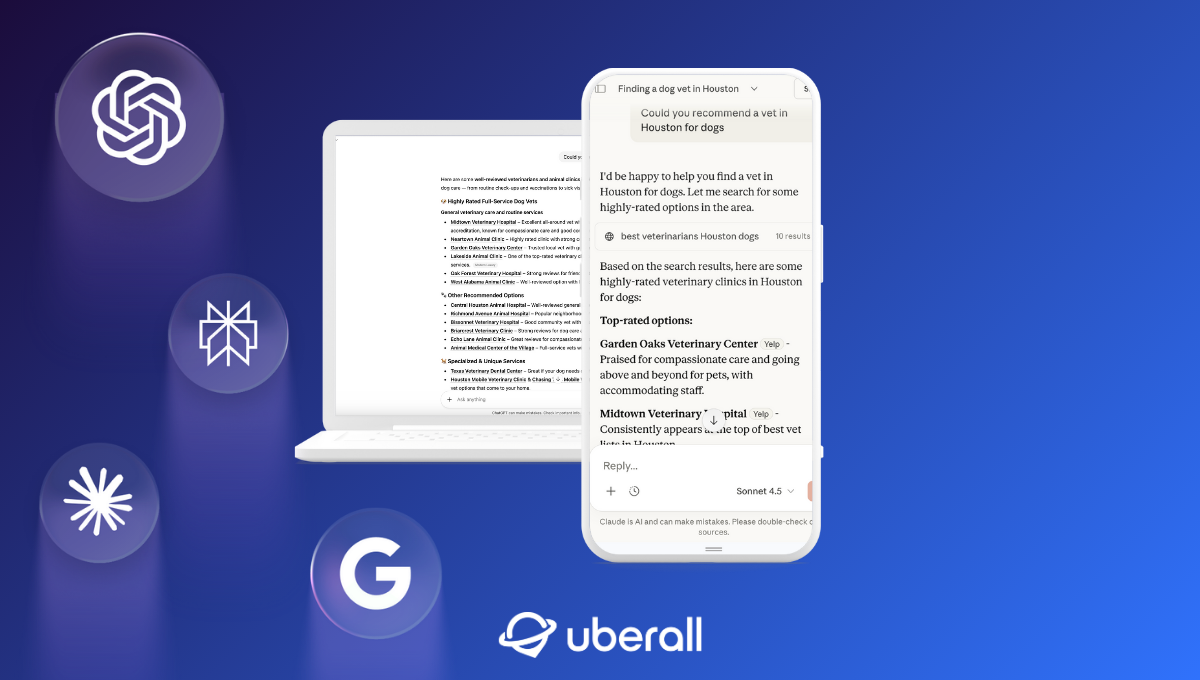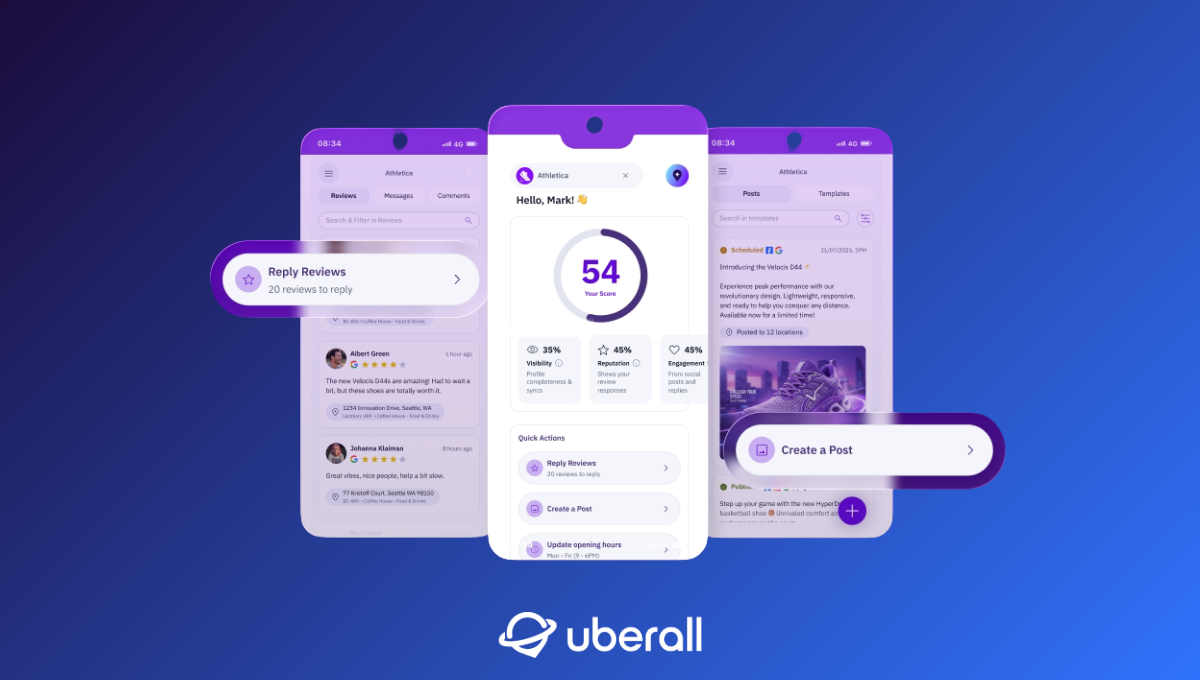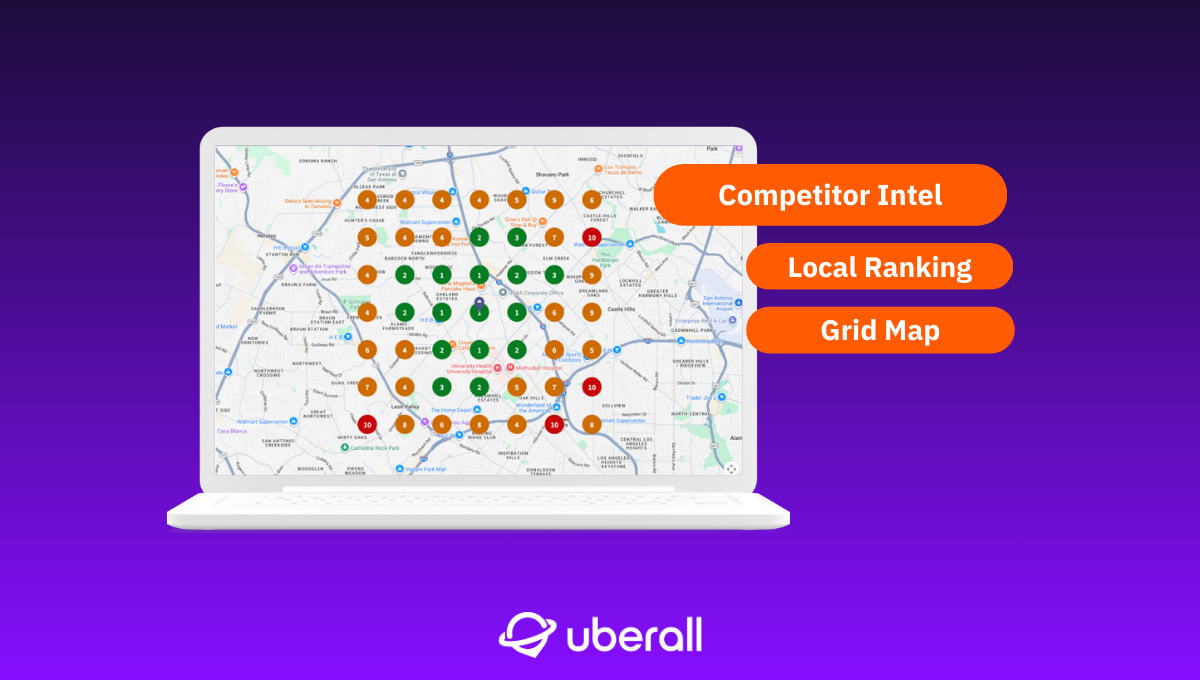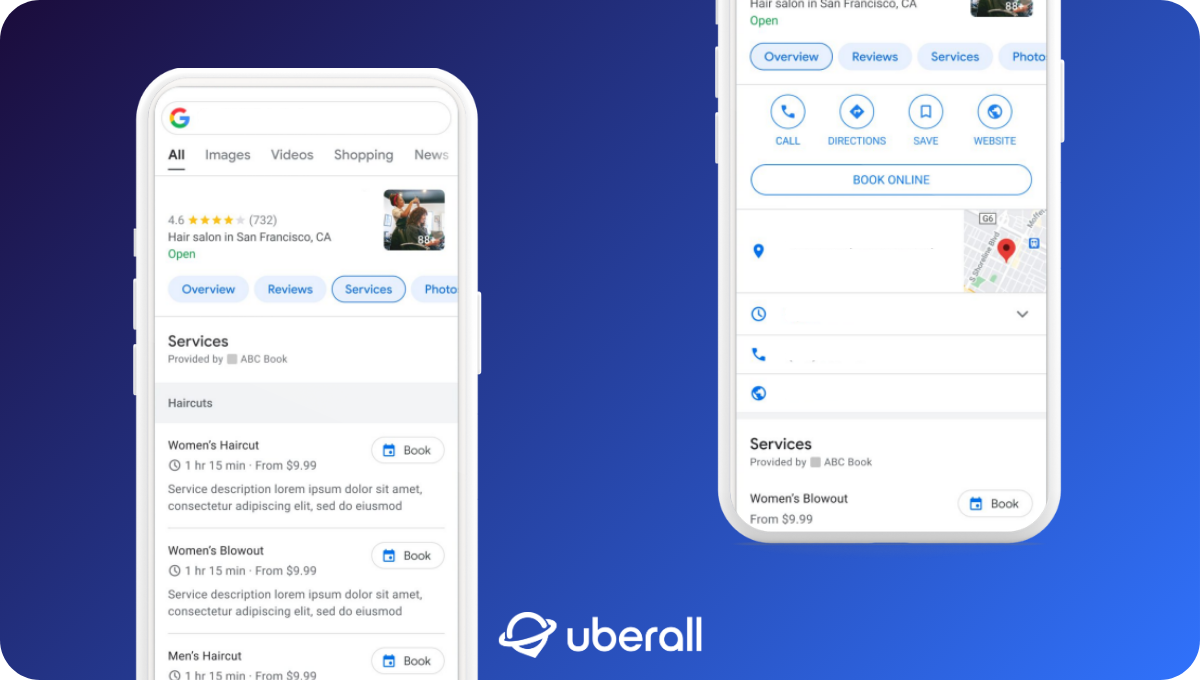
Local SEO vs Organic SEO: What’s the Difference and Which Is More Important?
Local SEO demands your immediate focus because every second (!) search has a local intent. We explain the difference towards organic SEO!
Organic SEO has long been the reigning champion, drawing businesses toward global visibility. However, a new contender has stepped into the ring: Local SEO. With its focus on the people nearby, it now stands at the forefront of search marketing, challenging the status quo and reshaping the way businesses approach online visibility.
To put things into perspective: organic search accounts for 53.3% of all web traffic and 99.1% of clicks on positions 1 to 10; that’s impressive. However, 46%of these searches have local intent and 28% of these searches result in a purchase.
So it’s official, local SEO demands your immediate focus. But what exactly sets local SEO apart from organic SEO? And which one will get you better results (fast)? In this blog article, we explain both the difference and synergy of organic and local SEO, and help you decide which SEO strategy is the right one for you.
What’s the Difference Between Local SEO and Organic SEO?
Local SEO and organic SEO often appear as contrasting forces. However, a closer look reveals they're more like two sides of the same coin. Rather than conflicting, they work hand in hand to bolster a business's online presence. Just think of organic SEO as the foundation, and local SEO as the essential finishing touch!
What is Organic SEO?
Organic search engine optimization—or organic SEO for short—focuses on optimizing a website's content, structure and technical elements for higher online visibility.
What is the difference between SEO and SEA?
Search Engine Optimization (SEO) aims to increase the organic search traffic without paying for their placement on search engine results pages (SERPs). Search Engine Advertising (SEA), on the other hand, means paying for advertisements to appear on top of SERPs, or other websites, above organic search results.
Like mentioned above, SEO mostly focuses on on-page—and off-page, for that matter—optimizations, whereas SEA involves bidding on keywords and creating corresponding ads. So while SEA provides immediate visibility (but requires investment), SEO is more of a long-term endeavor.
How Does Organic SEO Work?
To understand the concept of organic SEO, you need to grasp how organic search functions first—how search engines determine where to place your entries on search engine results pages (SERPs).
Organic search begins with search engines like Google scouring the internet to create a vast index of web pages. So when a user enters a query, Google's algorithms sift through this search index, considering factors like expertise, authority, and trustworthiness ( = EAT) to rank content accordingly. Finally, Google suggests the most relevant results to users, aiming to provide the best possible answer to their query.
The more expertise, authority, and trust Google attributes to your website, the more likely you are to be featured prominently in search results, thereby reaching consumers. This attribution, in turn, is tied to how well Google understands your content; which is why optimizing your website is crucial for success.
By optimizing your website, we mean:
- On-page optimizations to enhance the user (and search engine) experience through website speed, mobile-friendliness, HTML markups, and more.
- Off-page optimizations to enhance authority through listings management, review management, citation building, backlink building, and more.
Moreover, with valuable content, you can establish a strong online presence over time without relying on paid advertising—as long as you adhere to search engine guidelines (and maybe keep a close eye on algorithm changes).
What Are the Benefits of Organic SEO?
Organic SEO is an indispensable tool for all companies with a myriad of benefits for your business growth:
- Sustainable Visibility: Organic SEO ensures that your website ranks higher in search engine results pages without the need for ongoing ad spend.
- Credibility: Websites that rank organically are perceived as more credible by users, as they have earned their position through relevance, quality, and authority.
- Cost-Effectiveness: While initial investment may be required, the long-term benefits outweigh the costs, as organic traffic does not incur per-click charges.
- User Experience: Organic SEO often involves improving website usability like mobile responsiveness or page loading speed, leading to increased engagement.
- Targeted Traffic: By optimizing for relevant keywords and user intent, organic SEO attracts highly targeted traffic, increasing the likelihood of conversions.
- Measurement: The ease of measuring performance metrics in SEO activities facilitates scalability, allowing businesses to expand their strategies efficiently.
In a digital landscape teeming with competition, organic SEO remains a potent weapon for businesses seeking sustainable growth. But let’s move on to what we actually focus on (and are an expert for): local SEO!
What is Local SEO?
Similar to organic SEO, local SEO aims to boost a business’s visibility in search results, but places greater emphasis on attracting local customers who are ready to make immediate purchases. So the ultimate goal is to direct them to a (physical) store.
How Does Local SEO Work?
As with organic search results, search engines prioritize entries with the most relevant information matching a local search query. In fact, they consider:
- Relevance: how well a profile fits with what the user is looking for
- Distance: how far each potential search result is from the user’s current location
- Prominence: popularity of a profile, including positive review ratings
Moreover, the most important ranking factors evolve around on-page, review, link and citation signals as well as users’ behavior and companies’ personalization strategies.
What makes local search special is that search engines suggest locations nearby users whenever they assume a local intent. For instance, if a user searches ‘best pizza near me’, Google will show three nearby locations: the Local 3-Pack.
What is Local Intent?
Local intent refers to the user's intention to find products, services, or information within a specific geographic area—typically by adding location-specific terms to a search query, such as city names, zip codes, neighborhood names, or phrases like "near me", "close by" or "open now." Additionally, search engines may infer local intent based on the user's location if they have enabled location services on their device.
With organic search results, search engines show the websites that offer the most relevant and appealing content for users—regardless of whether a query is local or not. When Google and other search engines understand a user’s query as ‘local’, though, they supplement the organic search results with relevant locations near the user.
By targeting local keywords and geographic modifiers, businesses can enhance their chances of appearing in local map packs and attracting nearby customers who are actively searching for products or services in their area. Unlike organic search, though, where consumers tend to check out the top results, clicks on local pack listings are influenced directly by rating scores.
What Are the Benefits of Local SEO?
Harnessing the power of local SEO is a game-changer, propelling your business to new heights within your community:
- Enhanced Local Visibility: Local SEO significantly boosts your online presence within your specific geographic area, ensuring that potential customers in your locality can easily find and engage with your business.
- Targeted Customer Reach: By optimizing for local search queries, you attract customers who are actively seeking to purchase products or services in your area, increasing the likelihood of conversions and sales.
- Physical Traffic Generation: Through route planning features, such as Google Maps integrations, Local SEO literally directs customers to your doorstep, facilitating foot traffic and enhancing your offline presence.
- Higher Conversion Rates: Local search queries often indicate high purchase intent, making them more likely to result in actual sales compared to generic organic searches, thereby maximizing your return on investment (ROI).
- Trust and Credibility: Positive ratings and reviews garnered through Local SEO efforts establish trust and credibility among local consumers, influencing their purchasing decisions and fostering long-term customer relationships.
- Cost-Effective Marketing: Like organic SEO, local SEO strategies are generally cheaper and more effective than paid search advertising, offering a sustainable and efficient way to promote your business within your community.
While many of the benefits echo those of organic SEO, local SEO offers an even more targeted approach, ensuring that your business connects with the right audience at the right time.
Local or Organic SEO: Which is More Important for Your Business?
When being confronted with SEO, businesses often grapple with the pivotal question: local SEO or organic SEO? Which holds the key to maximizing online visibility and driving success? We say: neither and both!
The Decision is Yours
If your business relies on physical locations, you should integrate a local SEO strategy into your existing SEO strategy. An integrated SEO strategy is the best way to 1) be visible in online searches and 2) get customers to move from online search to in-store visit.
If your business does not have any brick-and-mortar locations, then you can—with good conscience—just focus on organic searches. More specifically, optimize your website with a view to attracting more visitors, which are not predominantly ‘local’.
Organic SEO Fundamentals: How To Optimize Your Website for Organic Searches
When it comes to enhancing your website’s ranking through organic SEO, there are several ways—or rather steps, because you should do all of them:
- Identify your target audience: Determine who you want to reach with your website.
- Understand customer needs: Identify what your customers are searching for.
- Keyword research: Match customer needs with common keywords to optimize your content.
- Content creation: Develop content tailored to keywords, establishing your expertise.
- Link building: Build internal and external links to signal authority to search engines.
- Utilize metadata: Optimize metadata elements like page titles, descriptions, and image titles to influence search engine display.
- Page structure: Organize your pages with clearly defined headings (H2, H3, H4, etc.) for improved readability and SEO.
- Regular content updates: Keep your website fresh and relevant by updating or adding new content on a consistent basis.
By implementing these strategies, you’ll attract more targeted traffic to your sites—but better be patient because SEO isn’t a sprint. Speaking of sports: do you know our gold medal guide for location marketing already?
Local SEO Fundamentals: How To Optimize Your Website for Local Searches
When it comes to local SEO, optimization goes beyond simply appearing in search results—it's about ensuring that potential customers find and engage with your business online. The following steps outline how to secure your position in the coveted Local 3-Pack:
- List your business profiles: Create profiles for each location on Google (GBP), Apple Maps, and other relevant search and mapping platforms to increase your visibility in local searches.
- Ensure accurate NAP information: Verify that your business's name, address, and phone number (NAP) are correct and consistent across all platforms, and keep your opening hours updated to provide accurate information to potential customers.
- Add local modifiers: Research local keywords that potential customers are using to find products or services like yours to target specific geographic regions and attract people to your stores.
- Utilize citations: Leverage citations on the most important online directories like Yelp, TripAdvisor, Facebook, and Instagram to establish your business's presence and credibility.
- Manage your reputation: Implement professional reputation management activities to maintain a positive online image and foster trust among local customers.
- Create local landing pages: Create local landing pages with relevant information such as opening hours and offers to add specific details about a particular business.
- Use social networks: Create local social media profiles where you can naturally meet your target group and enter into a dialog with them.
That way, you improve your online visibility and ultimately drive more traffic to your physical storefronts.
Covering Your SEO Bases
Summing up: local and organic search engine optimization encompass distinct objectives, but can—really: should—be integrated to maximize effectiveness. Though one aspect of SEO may not directly impact the other, optimizing the appropriate elements can lead to a more robust online presence.
We strongly advise you to make reputation management a part of your local SEO strategy, too. Active reputation management has a greater influence on your sales than you might think. After all, 95% of consumers refer to online ratings before making their final purchase decision. If you need any further advice, just reach out to our experts.
Ready to Transform Your Business?
Connect with our partnership team to learn how Uberall can help you achieve similar results. Get a personalized consultation and discover the opportunities waiting for your business.
Resources







